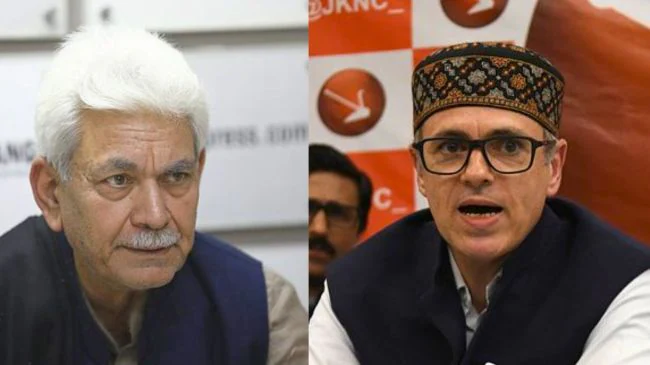
🧭 Shifting Sands in Kashmir’s Political Terrain
Soft-Pedalling
In a surprising contrast of tone, the Jammu & Kashmir National Conference (NC) has taken a sharply critical stand against Lieutenant Governor Manoj Sinha, even as party vice president Omar Abdullah continues to strike a relatively restrained and diplomatic note. This divergence is not merely cosmetic—it reflects deeper strategic calculations within the NC’s evolving political approach in the Union Territory.
While Omar maintains measured criticism aimed at safeguarding political space and engaging with Delhi, the party’s spokespersons and local leaders are increasingly adopting a confrontational line, especially over issues like delayed elections, administrative overreach, and erosion of democratic institutions.
🗣️ Dual Messaging or Strategic Division?
At first glance, Omar Abdullah’s moderate stance seems inconsistent with the party’s recent public messaging. While he has questioned the democratic delay in J&K, he has avoided personal attacks on L-G Sinha, instead choosing to emphasize electoral restoration and policy failures. In contrast, senior NC leaders like Tanvir Sadiq, Ruhullah Mehdi, and others have publicly accused the L-G administration of:
- Acting as a “Delhi puppet”
- “Choking political dissent”
- “Bypassing elected institutions”
This could be seen as an internal contradiction, but insiders argue it’s a calibrated strategy. “While Omar engages with national media and the diplomatic community, the local cadre must reflect the anger and frustration of the people. It’s a balancing act,” said a senior NC leader.
⚖️ Why Is NC Targeting L-G Sinha?
The central grievance of the National Conference lies in what they see as the systematic dismantling of democratic rights post the abrogation of Article 370 in 2019. Since then, J&K has been under central rule via the L-G, with no elected government in place.
Key triggers for NC’s hardened rhetoric:
- Delayed Assembly Elections:
Despite the completion of delimitation and panchayat polls, J&K continues to function under bureaucratic rule. NC leaders see this as a deliberate delay to weaken regional parties like theirs. - Curtailment of Freedoms:
NC has flagged repeated incidents of preventive detentions, surveillance, and denial of political permissions, especially during campaign events. - Land Evictions and Bureaucratic Control:
The L-G administration’s land eviction drives and civil service overhauls have drawn ire from locals, which NC is now channeling. - Weakening of J&K Institutions:
Omar and his party claim that institutions like the J&K Public Service Commission, anti-corruption bodies, and even local municipalities have become rubber stamps, lacking autonomy.
🎯 Tactical Softness by Omar: Why?
Omar Abdullah’s softer tone is not a sign of weakness, say observers, but rather a strategic bid to maintain channels of influence with the central government and broader electorate. Omar aims to present himself as a mature statesman, distinct from more strident voices, especially as he positions for a return to power should elections be held.
“He doesn’t want to be seen as disruptive or anti-India. That image won’t work with urban voters or even global observers,” says political analyst Muzamil Jaleel. “His balancing act allows the party to vent through others while he focuses on reclaiming electoral legitimacy.”
🧨 Risks of the Dual Strategy
While the twin approach may offer tactical flexibility, it also risks sending mixed signals to the electorate. Voters may question the sincerity of the NC’s opposition to central control if its top leadership sounds conciliatory.
Additionally, New Delhi may exploit these differences, painting the party as divided or inconsistent. The BJP has already accused Omar of “pretending moderation while running a party that fuels dissent”.
🗳️ What This Means for J&K’s Political Future
With elections still on indefinite hold, the National Conference appears to be staking its political relevance on vocal resistance to the L-G regime, while simultaneously preparing to contest as the moderate alternative to both BJP rule and separatist politics.
Whether this hybrid approach will win voter trust or backfire due to perceived duplicity remains to be seen. For now, the NC seems determined to keep all its political cards in play, even if that means speaking in two voices.
Thanks For Reading